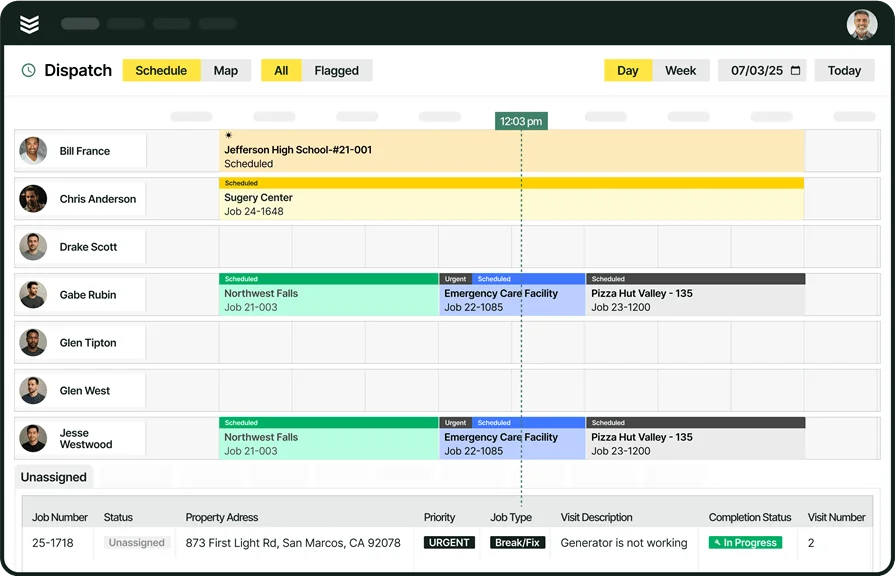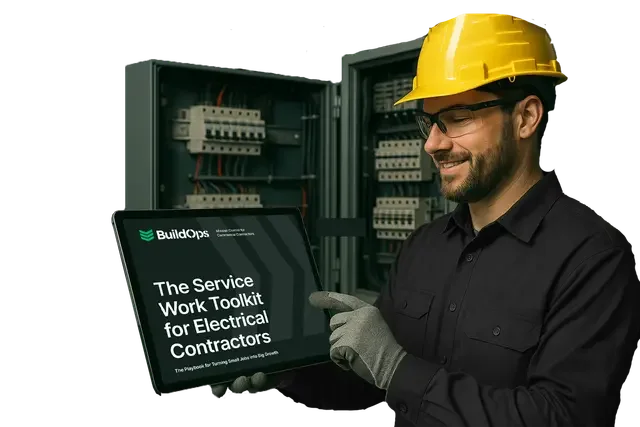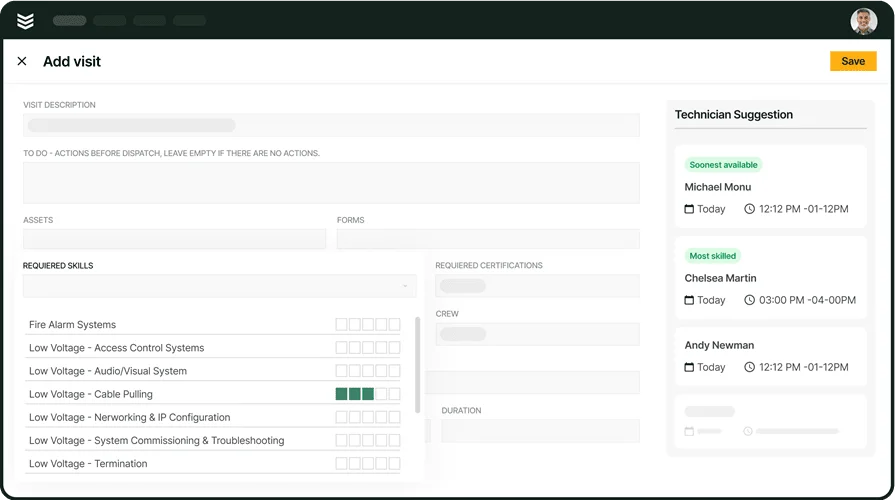Managing large-scale electrical jobs means balancing fast turnarounds, tight schedules, and safety-critical systems—across multiple sites. From tenant improvements to mission-critical infrastructure, electrical contractors face growing demands that basic tools can’t keep up with.
That’s where field service software for electrical contractors steps in. It helps track crews, simplify dispatch, and ensure nothing gets missed—especially on complex installs or recurring service agreements. But finding a tool that actually fits how your team works? That’s the challenge.
This guide breaks down what to look for, what tools actually deliver, and how electrical contractors are using software to cut downtime and boost margins. Here’s what we’ll cover:
- Choosing field service software for electrical contractors
- 6 key features to look for in electrical field service software
- 8 top field service software for electrical contractors
- 7 benefits of using electrical field service software
- 4 essential FAQs about field service software for electrical contractors
Before you invest in a system, you need to know which features move the needle—streamlining workflows, cutting delays, and helping you scale jobs without losing control. Let’s kick things off with how to choose the best-fit platform for your operation.
Choosing field service software for electrical contractors
Field work gets more demanding by the day. Job sites are tighter, deadlines are shorter, and crews are stretched thin. To stay ahead, electrical contractors need software that doesn’t just organize schedules—it needs to coordinate moving parts across the office and the field, adapt to the way your team operates, and make the day-to-day smoother for everyone using it.
Before you commit to a platform, here’s what you need to size up:
- Crew size and job complexity - Can it keep up with multiple job sites running at once? Does it allow you to track progress across different phases of work—like rough-ins, trim-outs, and final inspections? Can it assign the right techs based on licensing, certifications, or specialty work like fire alarm installs or switchgear wiring?
- Custom workflows - Can you tailor the way tasks move from one stage to the next? Does it let you adjust how tickets are submitted, what info is required on service calls, or how punch lists are tracked? Can the system match how your team actually operates, not force a cookie-cutter approach?
- Integration with existing tools - Will it connect with your estimating platform, accounting system, or project management dashboards? Can it sync with parts databases or supplier catalogs to keep inventory accurate? Are you avoiding double entry or juggling five apps just to invoice a single job?
- Field accessibility - Can your techs pull up service history, one-line diagrams, or panel schedules on-site without calling the office? Does it work on any device—tablets, phones, rugged laptops? What happens when there’s no signal—can they still access job info or upload updates?
- Features - Does it offer the functions you rely on—automated scheduling, time tracking, job costing, permit tracking, and inspection checklists? Are dispatchers able to see real-time crew locations and reassign tasks when delays hit?
When the work is complex and the stakes are high, you can’t afford a system that slows you down. Up next, we’ll break down the core features that separate a solid tool from a time-waster.
6 key features to look for in electrical field service software
Managing an electrical contracting business takes more than just assigning jobs and sending crews out. Whether you’re installing switchgear in a hospital, wiring up a high-rise, or juggling tenant buildouts and service calls—your crew needs clear instructions, accurate info, and tight coordination across teams.
Field service software helps cut the chaos so you’re not stuck chasing paperwork, missed updates, or repeat site visits that could’ve been avoided. Here are six key features you should consider:
1. Smart scheduling and dispatching
Coordinating electricians across multiple job sites takes more than a shared calendar. Between emergency calls, inspection deadlines, and ongoing installs, the real challenge is keeping the day on track without the chaos. Scheduling for electrical field service paired with dispatch tools gives your office full visibility into who’s available, where they are, and what they’re certified to handle.
That way, jobs aren’t delayed because the wrong tech was sent, or because the office is chasing people down by phone.
2. Technician mobile access
Field techs shouldn’t have to call the office every time they need a spec sheet or a service history. With mobile field service software, crews can pull up job details, log updates, add photos, and capture signatures right from their phone or tablet.
For instance, during a lighting retrofit at a medical facility, a journeyman electrician checks past service records on-site, logs changes made to the control system, and sends a completion report—complete with photos—to the office before even leaving the site. That’s less back-and-forth, faster billing, and a cleaner handoff.
3. Invoicing and payments
Delays in billing don’t just slow down revenue—they throw off the entire rhythm of your operation. When you’ve got teams moving fast across multiple projects, you need a system that keeps up. Invoicing tools for electrical field service software automatically pull in job details, labor hours, and parts used the moment a job is marked complete. And when it’s time to close out, payments features help you collect on the spot—no chasing, no guessing.
Let’s say your crew wraps up a multi-day breaker panel upgrade for a warehouse. Before they even leave the site, the tech finalizes the job, logs materials, and submits the report. The invoice hits the customer’s inbox immediately, and with online payment options built in, you get paid before the van even pulls back into the yard.
4. Service agreements and recurring maintenance
Keeping long-term clients happy means staying ahead of maintenance schedules. Whether it’s quarterly breaker checks or annual inspections for code compliance, service agreement tools for electrical contractors make sure nothing slips through the cracks. You can automate recurring visits, generate reminders, and tie work back to the original contract.
Think about a company servicing multiple data centers. Each site needs preventative maintenance on backup systems and switchboards every six months. Instead of relying on memory or sticky notes, the system schedules those visits automatically—helping your crew show up on time and your clients stay protected.
5. Fleet tracking and route optimization
Your trucks are always moving. But are they moving smart? Fleet tracking features give dispatchers visibility into crew locations and optimizes routes based on traffic, site proximity, and job urgency. That means less wasted time and tighter scheduling.
Say a crew finishes a job early near an industrial site with an open service ticket. The system flags the available team and reroutes them straight to the next call—no need to head back to the shop or waste a time slot. That keeps your trucks working, not waiting.
6. Reporting and analytics
You can’t fix what you don’t track. Reporting tools built into field service software for electrical contractors let you monitor job performance, labor efficiency, service trends, and financials—all in one place. With real-time dashboards, you can spot slowdowns, identify top performers, and make smarter calls about what’s next.
Let’s say your data shows repeat issues on fire alarm inspections from one crew. Instead of guessing, you dig into job notes, identify gaps in the checklist process, and deliver a targeted training update. Problems get solved faster—and future mistakes get avoided.
Other notable features for electrical field service software
Beyond the core essentials, the best platforms offer tools that take pressure off your team and tighten up the backend. These features may not be used every hour of the day—but when you need them, they save time, reduce mistakes, and help keep your operation moving.
- Time tracking – Track labor hours accurately across crews and job sites. Know exactly who was where, for how long, and what they worked on. Helps eliminate missed hours and clean up payroll headaches.
- Quoting and proposal tools – Build detailed, professional quotes that pull from labor rates, material costs, and project timelines. Create estimates on-site or in the office without starting from scratch.
- Sales pipeline visibility – Manage leads and contract renewals in one dashboard. Track upcoming bids, follow-ups, and long-term service deals so nothing falls through the cracks—even when your calendar’s packed.
8 top field service software for electrical contractors
There’s no shortage of field service platforms out there—but only a few can keep up with the complexity of electrical contracting. Whether you’re managing long-term service agreements, coordinating emergency responses, or tracking labor and permits across multiple job sites, the tools you choose need to work how your business works. Here’s how the top solutions stack up.
1. Best for commercial contractors: BuildOps
BuildOps is built for commercial electrical contractors who need a system that keeps up with high-volume service agreements, complex job sites, and nonstop project schedules—without the bottlenecks of generic software. It brings everything into one place: scheduling, dispatch, job tracking, asset management, compliance documentation, and real-time reporting. Your team doesn’t have to bounce between apps or track things manually—field and office stay connected from start to finish.
How pricing works: We provide weekly live demos that fit your schedule. No sales pitch, no fluff—just a real look at how it works for commercial electrical shops.
What sets it apart for electrical contractors: Every feature—from crew dispatch to inspection checklists and permit tracking—is designed for large-scale electrical operations. Unlike platforms that force you to bolt on third-party tools, BuildOps is fully integrated and built for how commercial contractors actually work in the field.

Curious how BuildOps works?
We help electrical contractors run more efficient, profitable operations.
2. Best for residential electricians: Housecall Pro
Image Source: Housecall Pro
Housecall Pro is a solid option for smaller electrical businesses focused on residential work. It offers a clean user interface, easy job scheduling, customer communication tools, and mobile invoicing. Techs in the field can view job details, message customers, and collect payment without needing to call the office. For home service contractors who prioritize speed and simplicity, Housecall Pro hits the mark.
That said, it may not be ideal for commercial contractors. The software lacks features for managing complex installs, multi-site projects, recurring service agreements, or detailed compliance documentation—making it harder to scale beyond residential jobs.
How pricing works: Housecall Pro uses tiered pricing based on features and number of users. Higher-tier plans include extras like batch invoicing, online booking, and marketing tools.
What sets it apart for residential electricians: It’s a user-friendly option for smaller crews doing fast-turnaround service calls. The mobile app makes job updates simple, and the built-in automations help reduce admin time for busy residential shops.
How does it stack up against BuildOps?: See here in our feature comparison of Housecall Pro vs BuildOps.
3. Best for general contractors: Jobber
Image Source: Jobber
Jobber is a go-to for contractors who handle a mix of residential and light commercial work. It includes tools for scheduling, CRM, quoting, and invoicing—all packaged in a dashboard that’s easy for teams to navigate. Jobber also includes client communication features like appointment reminders and follow-up messages, making it useful for customer-facing jobs.
But when it comes to large-scale electrical work, Jobber has some limitations. It doesn’t include deep compliance tracking, service agreement automation, or field tools robust enough for managing multi-phase installs across different sites. Larger commercial contractors may find themselves needing more power under the hood.
How pricing works: Jobber offers tiered plans, starting with a basic option for small teams and scaling up to more advanced features like quoting automations, batch invoicing, and route optimization.
What sets it apart for general contractors: It’s an accessible platform for electricians who take on mixed-scope work. If your team splits time between service calls and buildouts, Jobber helps you stay organized without overcomplicating the workflow.
4. Best for growing teams: Fergus
Image Source: Fergus
Fergus is built with scaling electrical businesses in mind. It helps contractors manage everything from quoting and job tracking to timesheets and invoicing in one platform. What makes it useful for growing teams is its ability to track job profitability in real time—so owners know which projects are paying off and which ones are dragging down margins. It also includes team scheduling and field updates to help crews stay aligned without constant check-ins.
That said, Fergus may not be the best fit for contractors working in high-complexity commercial environments. It leans more toward service and light project work, and may lack deeper customization and reporting for larger-scale jobs.
How pricing works: Fergus charges per active user, with flat monthly pricing. There’s a free trial available and no long-term contract required.
What sets it apart for growing electrical teams: For contractors building out teams and managing more job volume, Fergus gives you the tools to track labor, job health, and profit without needing enterprise-level setup.
5. Best for recurring maintenance work: FieldEdge
Image Source: FieldEdge
FieldEdge is built with long-term service contracts in mind, making it a strong option for electrical contractors who handle recurring maintenance, inspections, and equipment checks. It offers tools like recurring scheduling, equipment tracking, service history, and invoicing tied directly to contracts. The mobile app helps field techs stay on top of customer records, warranty info, and previous work completed—right from the jobsite.
That said, FieldEdge may not be the best fit for electrical contractors focused on large-scale commercial installs or multi-phase construction projects. Its strengths lean more toward the service side than full project management or complex field workflows.
How pricing works: FieldEdge uses quote-based pricing tailored to your business size and the features you need. Onboarding, training, and support are priced separately.
What sets it apart for service-based teams: If your electrical business depends on recurring service contracts and preventative maintenance, FieldEdge helps you stay organized, consistent, and on time—so nothing gets missed and every job is tracked.
6. Best for small electrical shops: Service Fusion
Image Source: Service Fusion
Service Fusion offers a clean interface and flexible tools for smaller electrical contractors looking to simplify day-to-day tasks. It covers dispatching, estimates, customer communications, invoicing, and payments all in one dashboard. It’s easy to get started and doesn’t require a dedicated admin team to manage setup or daily use—making it ideal for lean operations.
It does have limitations for contractors working with complex installs or multi-location project scopes. The reporting tools and workflow flexibility may fall short for larger operations that need deeper insights or more control across jobsites.
How pricing works: Offers flat monthly pricing with no long-term contracts. Plans scale based on the number of users and features needed.
What sets it apart for small shops: It’s a streamlined, user-friendly option that keeps office and field connected. If you’re running a tight crew and want reliable scheduling, fast quotes, and basic reporting—it delivers without overwhelming your team.
7. Best for quoting and estimates: ServiceM8
Image Source: ServiceM8
ServiceM8 is tailored for electrical contractors who need fast, flexible quoting tools without the bloat of enterprise systems. It simplifies job creation, quoting, scheduling, and invoicing in a mobile-friendly interface. One standout feature is its quote-to-job workflow—once a quote is approved, it automatically generates the job with linked details, cutting out double entry and speeding up turnaround. It's particularly useful for electrical contractors handling high volumes of small-to-mid-size service calls.
Still, ServiceM8 is limited in scope. It's only available on Apple devices and may lack the depth needed for tracking larger commercial projects or managing long-term contracts.
How pricing works: Tiered monthly plans based on number of active jobs per month. All plans are month-to-month, with no contracts.
What sets it apart for quoting-heavy teams: For electricians who build and send lots of quotes every week, ServiceM8 turns estimating into a fast, repeatable process—helping you win more work without adding admin overhead.
8. Best for fast onboarding: Kickserv
Image Source: Kickserv
Kickserv is a simple and approachable platform made for electrical contractors who want to get started fast. It covers the basics—scheduling, estimates, invoicing, and customer management—with a clear layout that’s easy for techs and office staff to learn. Its customer portal lets clients approve quotes, request service, and even handle payments without ever picking up the phone.
However, Kickserv may not offer the customization or integration depth needed for more advanced operations. It’s best suited for contractors looking to digitize quickly without diving into complex feature sets.
How pricing works: Offers a free tier for very small teams, with paid plans based on user count and feature access. Month-to-month pricing, no long-term commitment.
What sets it apart for quick-start teams: If you're looking for something your crew can pick up with zero friction—Kickserv keeps the tech light and the ramp-up fast.

Get the electrical contractor toolkit
Access successful strategies, real-life examples, and ready-made templates.
7 benefits of using electrical field service software
When you're managing tight deadlines, complex installs, and multiple job sites, having the right system in place isn’t just helpful—it’s how you stay competitive. Here are seven clear ways electrical field service software creates real value for contractors in the field and in the office.
1. Stronger crew coordination
With real-time visibility into schedules, job progress, and technician location, office staff can make smarter decisions on the fly. Dispatchers avoid overlapping assignments or sending the wrong tech, while field teams get the info they need upfront—reducing errors and wasted trips.
2. Faster cash flow
The sooner you send invoices, the sooner you get paid. Field service software helps electrical contractors cut billing delays by tying time tracking, material use, and job completion directly into invoicing workflows. Instead of waiting days for paperwork, invoices can go out the same day—keeping revenue moving. Check out our invoice template built for electrical contractors to see how digitizing your process can speed things up.
3. Less time lost on manual scheduling
Coordinating jobs through whiteboards, spreadsheets, or text threads burns time and invites mistakes. Field service software automates the process, assigns techs based on skill, proximity, or job type, and helps reduce missed appointments or unbalanced workloads. For tools that simplify this even further, here’s a look at our electrical contractor scheduling app guide.
4. Better job cost tracking
Knowing what each job actually costs—labor, materials, time—makes it easier to price future work and protect profit margins. With software, every detail is recorded and linked to the job file. This lets contractors see which projects are draining resources and which ones are making money.
5. Cleaner documentation and records
Having full job histories, inspection notes, and customer communication in one place helps protect your business. Whether you need to prove compliance, pull service history for an inspection, or provide documentation to a GC, software keeps everything organized and easy to access when it counts.
6. Tighter customer management
When customers call in, they don’t want to repeat their entire history. Field service tools make it easy to log interactions, track equipment, and flag recurring issues so your team knows exactly what’s going on. It also helps with long-term follow-ups, upselling, and quoting new work. Learn how a purpose-built CRM for electrical contractors can improve retention and simplify communications.
7. Easier growth without more overhead
As your job volume increases, software helps you scale without adding more admin. Automating repetitive tasks—like dispatching, time logging, and customer updates—frees up your team to focus on higher-impact work. That means you can grow crews, take on larger jobs, and expand without hiring extra office staff to keep up.
4 essential FAQs about field service software for electrical contractors
Whether you're just starting to explore software or looking to switch platforms, it's normal to have questions. These are the most common ones electrical contractors ask when weighing their options—and what you need to know before making a decision.
1. What is field service software for electrical contractors?
Field service software for electrical contractors helps manage scheduling, dispatching, invoicing, job tracking, and customer records—all in one platform. It seamlessly connects office staff with field crews in real time, improves job visibility, reduces paperwork, and boosts overall efficiency.
2. How does field service software help reduce callbacks or repeat visits?
By giving techs access to real-time job info, service history, and customer notes, software helps prevent mistakes before they happen. Electricians arrive better prepared, with the right tools and full context. It cuts miscommunication and increases first-time fix rates.
3. Can field service software improve how we handle customer communication?
Absolutely. With a built-in CRM, customer info is centralized—so your team can quickly pull up past jobs, equipment, and service notes. Automated reminders, confirmations, and updates help you stay proactive, reduce no-shows, and build trust with every touchpoint.
4. What are best practices for getting the most out of field service software?
Software is only as effective as how it's used. The goal is to build consistent, field-ready processes your entire team can follow. These best practices help you avoid headaches and get full value from your system:
- Set clear naming conventions for job types, assets, and customer records
- Train your techs regularly, especially when new features roll out
- Use tags or filters to track job priority, skillset needs, or location zones
- Log time and materials in real time, not at the end of the day
- Automate recurring service visits based on contract terms
- Connect your software to accounting to avoid double entry
- Schedule regular data reviews to clean up duplicates or errors
- Assign an internal owner who can oversee adoption and performance
The work electrical contractors do is demanding. Between tight timelines, detailed installs, and shifting schedules, keeping the field and office aligned is half the battle. Field service software isn’t just about replacing clipboards and whiteboards—it’s about giving your team the visibility and control they need to do great work at scale.
Whether you're focused on recurring service contracts, managing multiple job sites, or trying to grow without adding more overhead, the right software can help make it possible. And for commercial contractors who need a platform built to handle the complexity of the work—everything from compliance tracking to multi-crew dispatch—an all-in-one system like BuildOps makes the job smoother from start to finish.

Take a closer look at BuildOps
Manage jobs from first call, ensuring they stay on track and you’re paid on time.








